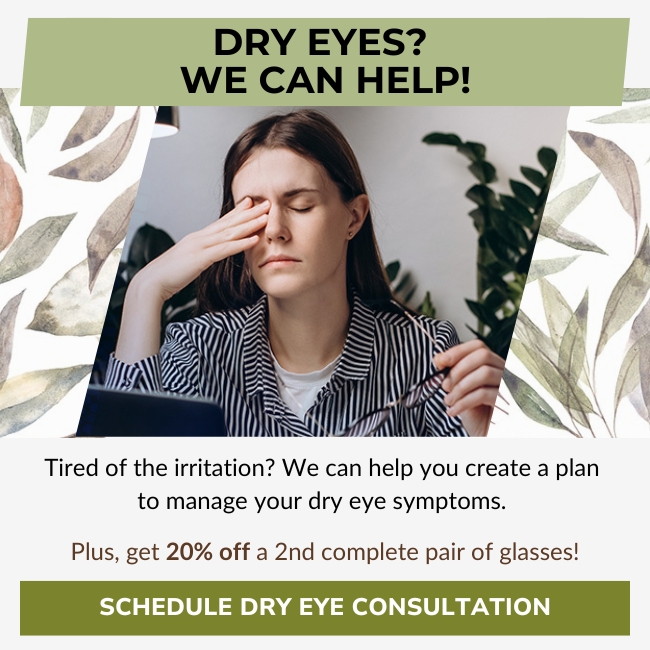If you’ve ever noticed those annoying little specks floating across your vision, you’ve likely dealt with an eye floater before. Flashes of light can also be an occasional issue for some people. These symptoms can be more common than you think and can be caused by several eye conditions and health conditions, including diabetes. However, dry eye itself does not generally cause floaters and flashers.
Dry eye typically affects the surface of your eye due to a problem with your tear production and rarely affects the inside mechanisms of the eye. Floaters and flashers are often caused by a problem with the vitreous gel or retina inside your eye rather than surface issues related to dry eyes.
What Is Dry Eye Disease?
Dry eye disease is a condition that causes several uncomfortable symptoms when your tear film stops working properly. Your tear film protects your eye and helps hydrate the surface of your eye. To do this, it requires a balance of 3 layers:
- The inner mucous layer, which helps stabilize your tears
- The middle aqueous layer, which helps flush away contaminants and keep your eyes hydrated
- The outer oil layer, which helps stop your tears from evaporating too quickly
When there’s an imbalance in your tear film or your eyes can’t produce enough tears, your eyes can become unprotected, vulnerable, and much more irritated and sensitive.
Dry Eye Symptoms
Dry eye often feels quite like it sounds—like your eyes are dry and irritated. Feeling like you have sand in your eyes is a classic dry eye symptom. Some of the other common symptoms of dry eye disease include:
- Stinging and burning sensations
- Blurred vision
- Eye fatigue
- Difficulty wearing contact lenses
- Watery eyes
- Visible redness
When you experience these symptoms, we can help you get relief. Dry eye can have many potential causes and finding the underlying cause of your symptoms with an eye exam is the first step in picking the right type of dry eye treatment.
What Are Eye Floaters & Flashes?
Eye floaters are tiny specks or cobweb-like shapes that appear in your field of vision. They’re made up of clumps of protein or cells within the vitreous body of the eye, the gel-like substance filling your eye.
Floaters can move around as your eyes move and can obstruct light as it enters the eye. Because of this, they’re often much more visible in well-lit environments or against bright backgrounds.
Flashes appear as streaks of light or sparkles in your vision. They often affect your peripheral vision—your side vision.
In most cases, flashes and floaters are harmless. However, there are some signs that something more serious may be occurring:
- A sudden increase in the size or number of floaters
- A shadow or darkness that appears in your peripheral vision or across your field of vision
- A change in your vision quality.
These symptoms may be a sign of a more serious condition beginning to develop. In some cases, these conditions require prompt medical attention. If you notice any significant changes in your vision or any of the symptoms above, you should schedule an eye exam.

What Conditions Can Cause Eye Floaters & Flashes?
While dry eyes don’t cause flashes and floaters, they may occur together. That’s because both dry eyes and some of the conditions that can cause flashes and floaters share certain risk factors, such as age and diabetes.
Some potential causes of flashes and floaters include:
- Trauma or a recent eye injury
- Retinal detachment
- Eye infections
- Certain medications that cause changes in the eye
- Diabetic retinopathy
- Age-related macular degeneration (AMD)
If left untreated, these conditions can cause significant lifelong damage to your eyes. Fortunately, many of them can be detected and treated early with routine eye exams. Keeping a close watch on your eye health is important for those who have an increased risk of developing eye conditions like diabetic retinopathy and AMD.
Comprehensive Eye Care in Barrie
If you’re experiencing dry eye, floaters, flashers, or any other potential problems with your vision, come visit our team. We can examine your eyes to determine what’s causing your vision problems and recommend appropriate treatment.
Contact us to book an appointment today, and let’s work together to support your long-term eye health.



